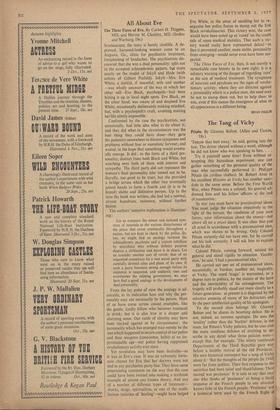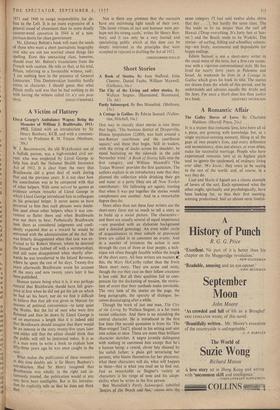The Tang of Vichy
Main. By Glorney Bolton. (Allen and Unwin, 18s.)
`THROW that butt away,' he said, getting into the taxi. The driver obeyed without a word, although he did not know who was speaking to him. . . .
Try it yourself some time! Even without at- tempting this hazardous experiment, one can gather something of the personal quality of the man who successfully performed it : Philippe Pdtain (in civilian clothes). M. Robert Aron in his excellent Histoire de Vichy has another anec- dote in the same sense. Before the First World War, when Petain was a colonel, his general ad- dressed, him and his fellow officers at the end of manceuvres `In war you must have no preconceived ideas. You must judge the situation objectively in the light of the terrain, the condition of your own forces, your information about the enemy—but above all no a priori ideas. It was clear that you all acted in accordance with a preconceived idea, which was shown to be wrong. Only Colonel Petain certainly did not have one, for he carried out his task correctly. I will ask him to explain what he did.'
Colonel Petain, coming forward, saluted his general and stood rigidly to attention. 'Gentle- men,' he said, 'I had a preconceived idea.'
He carried out one set of preconceived ideas, successfully, at Verdun; another set, tragically, at Vichy. The word .`tragic' is warranted, to a degree rare in politics, by the stature of the hero and the inevitability of his entanglement. The tragedy will probably stand out more clearly to a future generation : at present it is disguised by the selective amnesia of many of his detractors and by the poor intellectual quality of his apologists.
To the second class belongs Mr. Glorney Bolton and he shares its besetting defect. He is not, indeed, an extreme apologist. He uses the `senility' rather than the `buckler' defence, in the main, for Petain's Vichy policies, but he uses also the more insidious defence of omitting to de- scribe in any detail what those policies were except that, for example, 'The ninety -cumbrous Departments of the Third Republic gave waY before a healthy revival of the old Provinces! His own historical retrospect has a tang of Vichy; about it : `But the thoughts of the people [in 19401 were far from politics. Their first response to the armistice had been relief and thankfulness. Their second was penitence.' It is safe to say that any one Who thinks of `penitence' as being a likely' k response of the French people to any situatioe knows little of the French people. 'Penitence' was a technical term used by the French Right ill 1871 and 1940 to assign responsibility for de- feat to the Left. It is no more expressive of a general mood of abasement than its more deadly counter-word epuration in 1944 is of a non- partisan desire for clean government.
Mr. Glorney Bolton's book will meet the needs of those who want a short journalistic biography and who are not too worried about things like spelling. Even this unexacting class, however, should treat Mr. Bolton's translations from the French with caution. He tells us that, at his trial, Pdtain, referring to a favourable witness, said : 'I am nothing here in the presence of General Lannurien.' This Dostoievskian humility hardly seems in character. I should guess that what Pdtain really said was that he had nothing to do with having the witness called (Je n'y suis pour

































 Previous page
Previous page